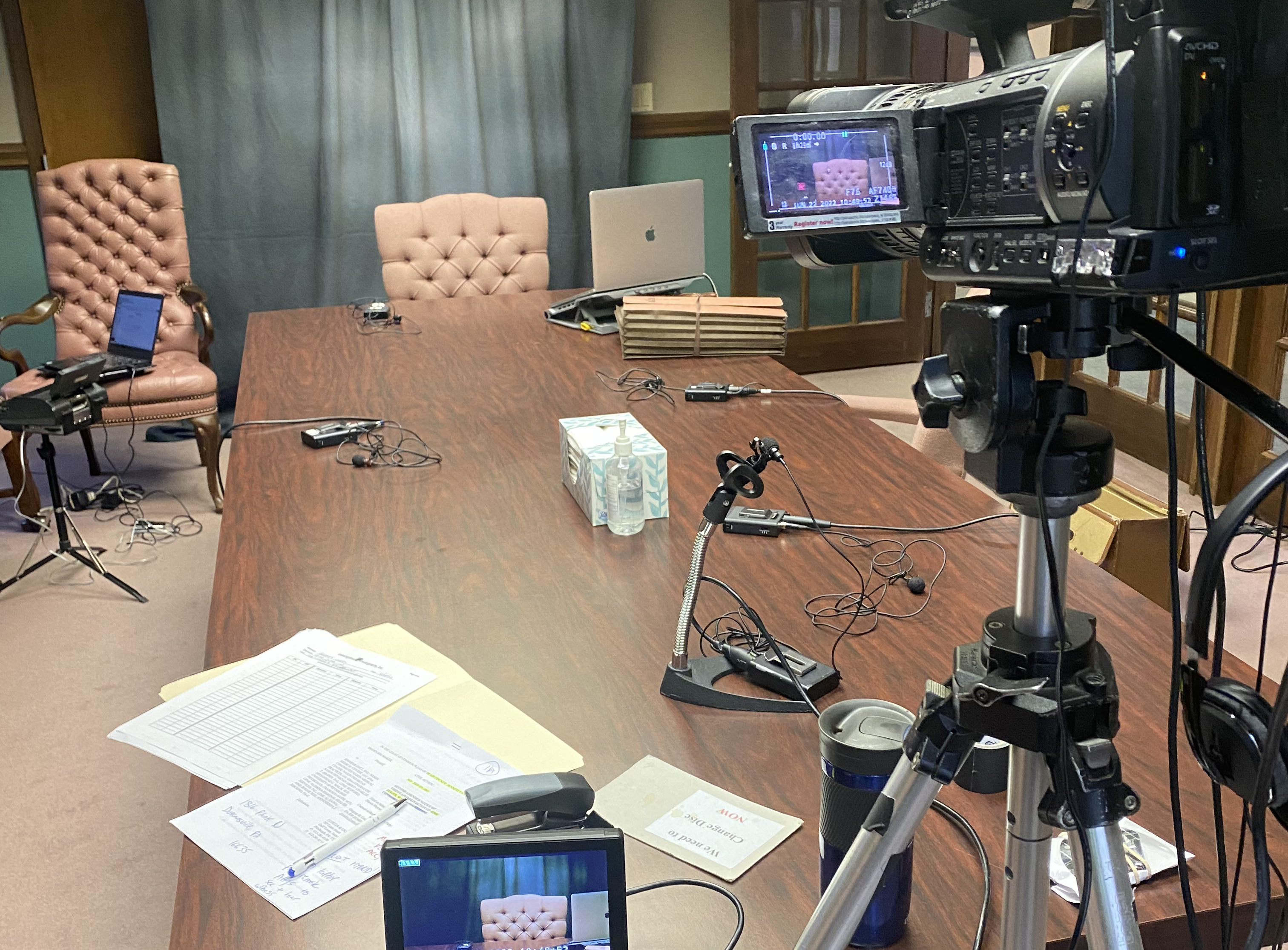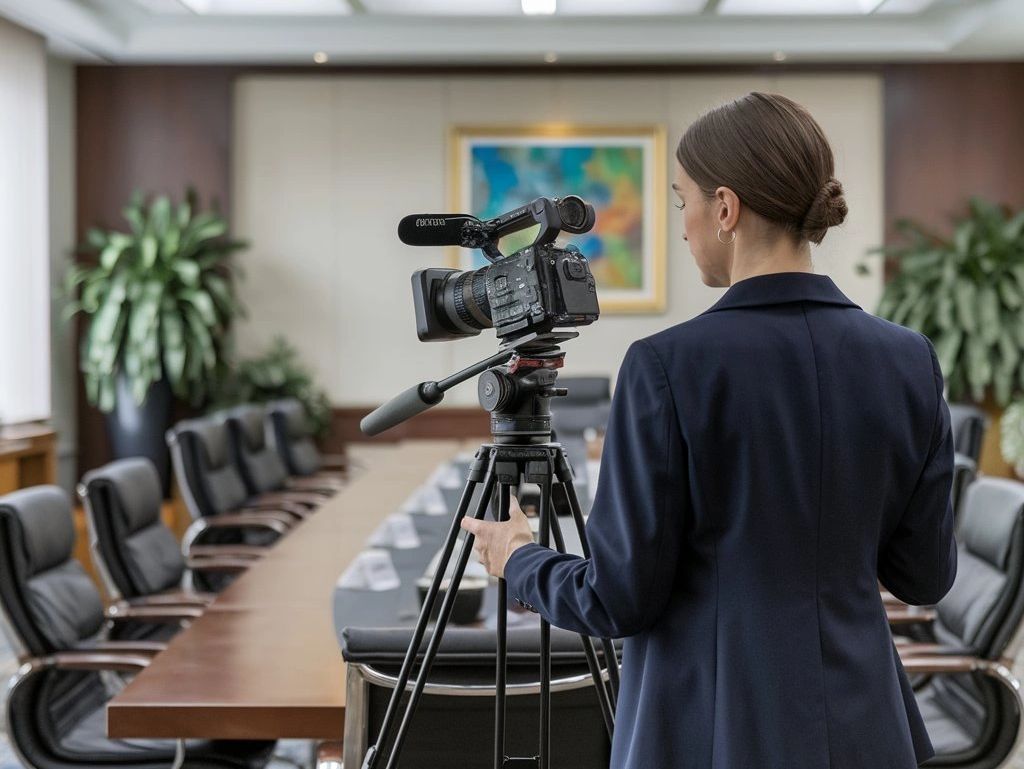Using legal video depositions to increase jury understanding of complex testimony
Wiki Article
The Importance of Legal Video Clip Depositions in Modern Legal Providers: What You Need to Know
Lawful video clip depositions have come to be crucial in today's lawful landscape. They supply a multidimensional sight of witness statements that standard transcripts just can not match. By recording both non-verbal and verbal interaction, these depositions boost the total understanding of a witness's reputation. Nonetheless, the efficiency of video depositions hinges on various variables, consisting of conformity with legal standards and ideal techniques (legal video depositions). Discovering these components discloses their true value in contemporary legal servicesWhat Are Lawful Video Depositions?
Lawful video depositions work as an essential device in the litigation process. They entail tape-recording witness testaments in a video style, recording both verbal and non-verbal communication. This technique permits attorneys to document the demeanor, expressions, and reactions of witnesses, providing a richer context for the testament. Usually performed in a regulated atmosphere, these depositions are led by attorneys who ask questions while a stenotype reporter records the dialogue. The resulting video clip can be important for test preparation, as it makes it possible for lawyers to examine the reputation of witnesses and improve their approaches. Furthermore, lawful video depositions can be made use of in numerous legal contexts, ranging from civil disputes to criminal situations. The acoustic and aesthetic aspects of video clip depositions boost the discussion of proof, making it an essential element in the contemporary lawful landscape. On the whole, they add considerably to the efficiency and effectiveness of legal process.
Advantages of Video Clip Depositions Over Typical Techniques
Video depositions provide many advantages compared to traditional methods of taking witness testimonies. One significant advantage is the capacity to record both audio and aesthetic components, giving an extra detailed document of the witness's statements. This dual format boosts quality and enables lawyers to reference specific subtleties throughout test preparation. Additionally, video depositions promote remote participation, making it easier for witnesses that might be not available for in-person looks because of geographical constraints or wellness issues.Moreover, video clip depositions can speed up the general deposition process, lowering the moment and costs connected with travel and logistics. They also boost availability, as videotaped depositions can be quickly shared among lawful teams and referenced at any moment. This comfort contributes to far better case monitoring and preparation. Overall, video clip depositions represent a modern-day, effective approach to gathering witness testimonies, lining up with the evolving needs of the lawful profession.The Role of Body Language and Tone in Testimonies

In lawful video clip depositions, body language and tone play important duties in conveying a witness's trustworthiness and reliability. Nonverbal signs can give insights right into a witness's psychological state, affecting just how their statement is viewed. Recognizing the impact of these elements is necessary for lawyers and jurors alike when assessing the integrity of a statement.
Nonverbal Communication Insights
While spoken communication is frequently stressed in lawful testaments, nonverbal signs such as body movement and tone play an important function in communicating trustworthiness and feeling. Viewers of depositions might keep in mind that a witness's stance, gestures, and faces can substantially affect understandings of integrity. For example, regular eye call might signify confidence, while preventing stare can recommend dishonesty or discomfort. The tone of voice-- its quantity, pitch, and speed-- can present sensations of sincerity or uncertainty. Lawful experts must be in harmony with these nonverbal signals, as they usually supply vital context that complements talked words. Understanding these subtleties can improve the effectiveness of depositions and affect the outcome of lawful procedures.Emotional Tone Influence
The emotional tone communicated during lawful testaments considerably impacts just how a witness is perceived. Body movement, vocal inflections, and face expressions play crucial roles in shaping the story of a statement. A witness showing confidence via stable eye call and a calm tone can infuse a sense of integrity and involvement. Conversely, indicators of anxiety, such as fidgeting or an unsteady voice, may cause suspicion concerning their account. The nuances of psychological expression can affect the analysis of truths, making it crucial for lawful specialists to identify these signs. In video clip depositions, the acoustic and visual parts incorporate, emphasizing the significance of emotional tone in sharing sincerity and reliability within the lawful procedure.Integrity and Reliability
A vital element in establishing trustworthiness and credibility during statements hinges on the witness's body language and intonation. Onlookers usually depend on non-verbal hints-- such as eye get in touch with, click to investigate stance, and motions-- to analyze a witness's sincerity. A witness that maintains eye get in touch with and displays open body language might be viewed as even more straightforward and reputable than one who avoids eye contact or appears shut off. Furthermore, intonation plays a vital role; a stable, tranquil tone can enhance the trustworthiness of the statement, while variations in pitch or quantity may increase uncertainties. Inevitably, the combination of body language and vocal tone substantially affects how a witness's statements are gotten and analyzed in a legal context.Best Practices for Carrying Out Video Clip Depositions
Carrying out video clip depositions requires careful preparation and implementation to guarantee a effective and clear discussion of testament. Initially, it is essential to choose a quiet, well-lit place to minimize disturbances and safe optimal video clip top quality. The tools should be tested ahead of time, consisting of electronic cameras, microphones, and lighting, to stay clear of technical problems during the deposition.Next, celebrations included should examine the layout and treatments in advance, ensuring that everybody comprehends their functions. The deponent must be briefed on the process, including just how to respond clearly and concisely.Additionally, maintaining a specialist behavior throughout the session is important. This includes avoiding from talking over one an additional and confirming that all concerns are directed properly. It is important to tape the deposition in a style that permits for simple playback and testimonial, preserving the honesty of the statement for future usage.Lawful Considerations and Compliance Issues
Exactly how do legal considerations and compliance issues impact the performance of video clip depositions? Lawyers should browse an intricate landscape of laws, guaranteeing that video clip depositions stick to administrative guidelines and requirements. Compliance with regulations worrying personal privacy, approval, and taping methods is crucial. As an example, obtaining specific consent from all parties included is necessary to stay clear of legal repercussions.Additionally, the admissibility of video proof in court can depend upon compliance with step-by-step demands. Making sure that the equipment utilized fulfills technical standards is also crucial, as inadequate high quality can weaken the deposition's reliability.Moreover, lawyers must be mindful of any kind of particular state regulations that regulate video clip depositions, as these can vary considerably. Failure to address these considerations can not only jeopardize the stability of the deposition however likewise influence the general situation approach, eventually influencing the client's lawful results.Exactly How Video Depositions Effect Jury Perception
While video depositions can function as powerful devices in legal procedures, their influence on jury understanding is substantial. The acoustic and visual elements of video clip recordings give jurors with a more extensive understanding of witness demeanor, trustworthiness, and psychological reactions. This multimedia strategy can improve the jurors' capability to examine the reliability of statement contrasted to conventional text-based transcripts.Moreover, video clip depositions allow jurors to observe body movement, tone of voice, and faces, all of which can impact their analysis of the witness's declarations. The presence of a witness on screen can humanize them, promoting compassion and link, which may guide jurors' viewpoints. On the other hand, a witness who shows up incredibly elusive or unreliable on video might cause unfavorable perceptions that influence a court's choice. Inevitably, the dynamic nature of video clip depositions plays a vital function in shaping just how jurors translate evidence and reach their judgments.The Future of Video Depositions in Legal Method
As developments in technology remain to improve the legal landscape, the future of video clip depositions is poised for considerable evolution. Developments such as expert system, online truth, and boosted video conferencing tools are anticipated to simplify the deposition process and improve ease of access. Attorneys may utilize AI-driven analytics to analyze witness credibility and instance stamina a lot more effectively.Moreover, the integration of online fact can allow courts to experience immersive simulations of depositions, providing deeper context and understanding. In addition, the fad toward remote depositions is likely to persist, using better flexibility for clients and attorneys alike.As remote job becomes progressively stabilized, video clip depositions will likely become basic method, reducing costs and time restraints linked with standard methods. Generally, these technological advancements guarantee to improve the performance, effectiveness, and accessibility of video depositions in lawful practice, eventually changing exactly how lawyers prepare for test.Frequently Asked Questions
How Much Do Legal Video Depositions Usually Price?

Can Video Clip Depositions Be Made Use Of in Any Type Of Type of Situation?
Video clip depositions can be used in different sorts of instances, including civil, criminal, and household law. Their adaptability permits attorneys to present witness testimonies properly, adapting to the specific requirements of different lawful situations.What Equipment Is Needed for a Video Clip Deposition?
To perform a video deposition, necessary devices consists of a top notch camera, microphone, lighting, and a reliable recording device. In addition, a computer with editing and enhancing software application may be essential for post-production and formatting the final video clip.Exactly how Long Does a Common Video Clip Deposition Last?
A typical video deposition lasts between 2 to 4 hours, relying on the complexity of the case and the number of concerns postured. Prolonged sessions might happen, yet breaks are Read Full Report generally incorporated for participant convenience.

Are Video Clip Depositions Admissible in Court?
Video clip depositions are usually permissible in court, offered they abide by lawful requirements and rules of evidence. Their use improves quality and preserves witness statement, aiding in the judicial process during trials and hearings. Legal video depositions have come to be essential in today's lawful landscape. In addition, lawful video clip depositions can be used in different lawful contexts, varying from civil conflicts to criminal situations. Furthermore, video clip depositions assist in remote engagement, making it simpler for witnesses who might be not available for in-person looks due to geographical restrictions or health and wellness issues.Moreover, video clip depositions can quicken the general deposition procedure, decreasing the time and prices associated with traveling and logistics. Making certain that the tools made use of fulfills technological criteria is likewise essential, as poor high quality can undermine the deposition's reliability.Moreover, lawyers need to be aware of any details state legislations that regulate video clip depositions, as these can differ greatly. Furthermore, the pattern towards remote depositions is likely to linger, supplying higher flexibility for customers and lawyers alike.As remote work becomes increasingly normalized, video depositions will likely come to be common method, minimizing costs and time restraints associated with traditional approaches.Report this wiki page